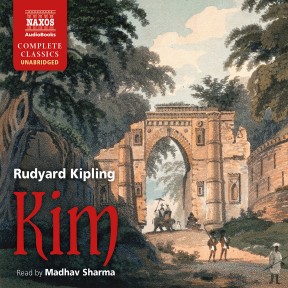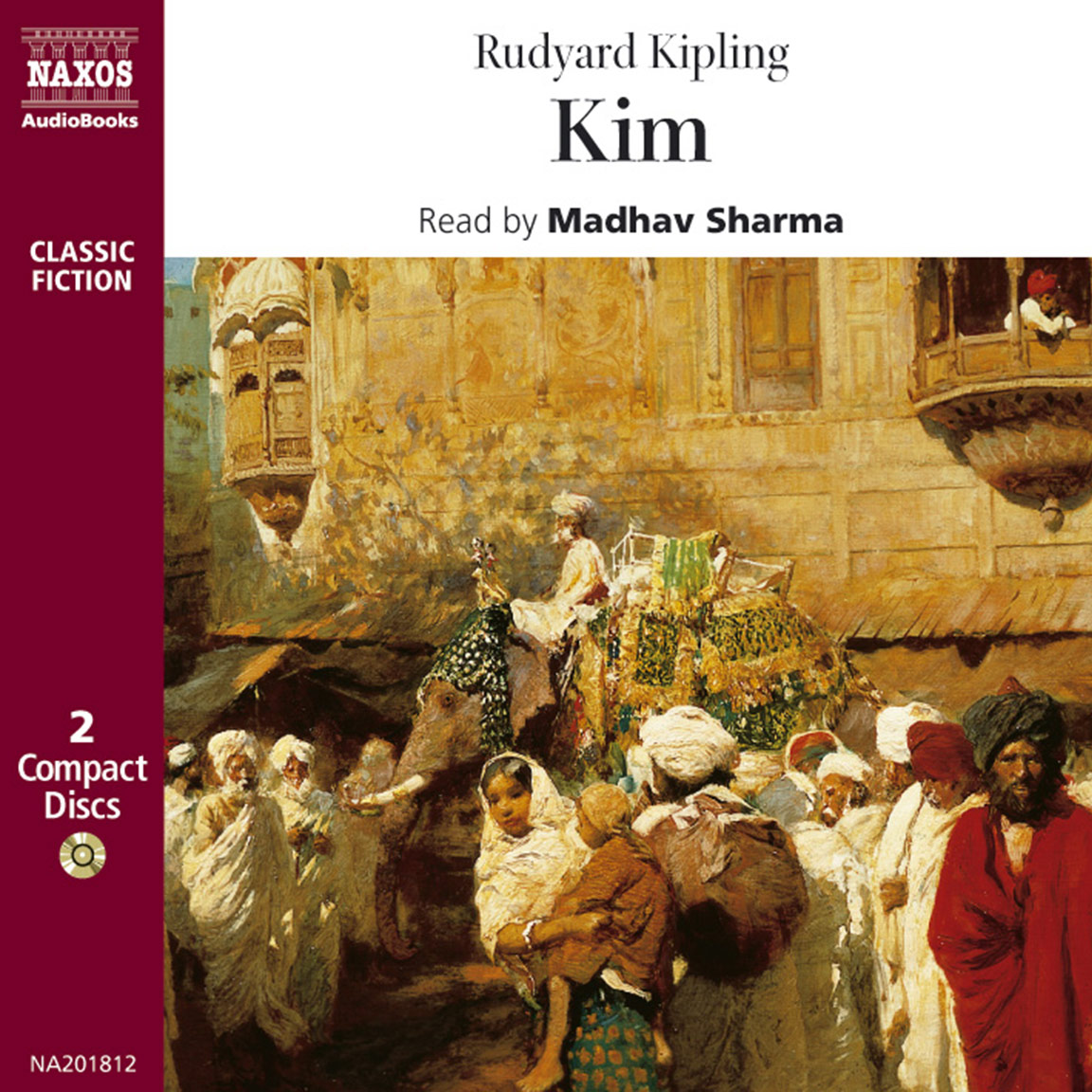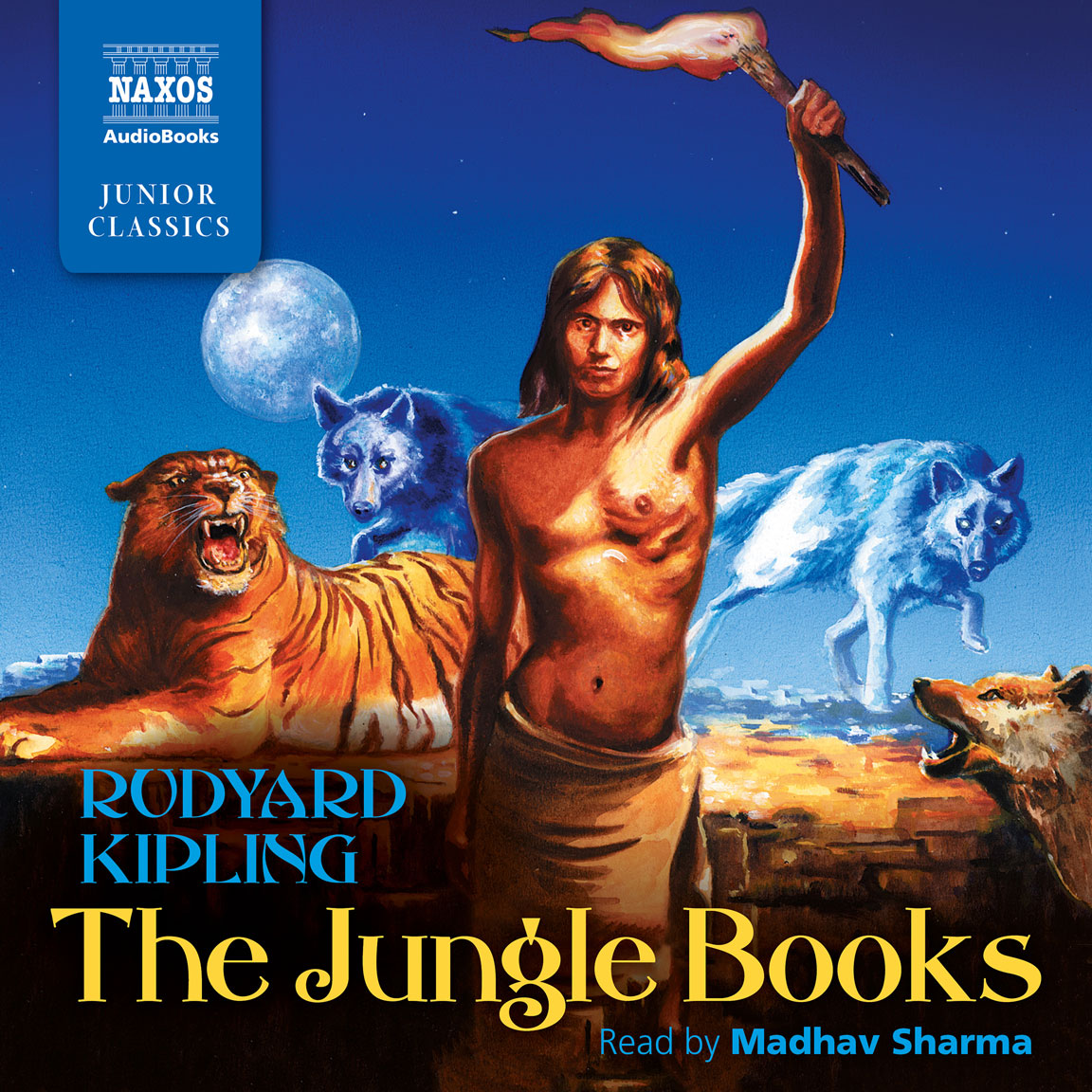
Audio Sample
Rudyard Kipling
Kim
Read by Madhav Sharma
unabridged
Set in the days of the British Raj, Kipling’s finest novel is the exciting and touching tale of an Irish orphan-boy who has lived free in the streets of Lahore before setting out, with a Tibetan Lama, on a spiritual quest. Kim later enrols in the Indian Service and simultaneously embarks on an espionage mission of supreme importance. A thrilling climax in the Himalayas occurs when the two quests become entangled. Kim’s search for identity is staged within one of the most magnificent and affectionate portrayals of Indian culture in literature.
-
Running Time: 13 h 19 m
More product details
Digital ISBN: 978-962-954-821-6 Cat. no.: NAX91612 Download size: 195 MB BISAC: FIC004000 Released: December 2009 -
Listen to this title at Audible.com↗Buy on CD at Downpour.com↗Listen to this title at the Naxos Spoken Word Library↗
Due to copyright, this title is not currently available in your region.
You May Also Enjoy
Reviews
Kim, the ‘little friend of all the world’ and chela or disciple to the questing lama, is caught up in the espionage of ‘the Great Game’. The real protagonist in his magical adventure, however, is India in all its teeming life, mystery and beauty, highlighted by a captivating narration.
Rachel Redford, The Observer
Espionage has become so sophisticated and hi-tech that it’s difficult to believe that this, the greatest of all spy stories, was published more than a century ago when agents relied on wits rather than gadgets. Set against the background of the Great Game being played between Britain and Russia on the north-west frontier after the second Afghan war, it tells the story of an 11-year-old orphan boy who looks and sounds like a native but beneath his filthy rags is white. Kim, né Kimball O’Hara, wears his Irish soldier father’s ID round his neck and survives by running errands for a wily Pashtun horse trader with an ancient Islamic proverb to suit every occasion. ‘Children should not see a carpet on the loom until the pattern is made plain,’ he advises, his great red beard wagging solemnly. What Kim doesn’t know is that his mentor is also a “chain man” or spy for the British. Mahbub Ali’s constant travels through the subcontinent, selling horses to army officers and maharajahs, affords the perfect cover. How Kim, travelling with a holy lama in search of the sacred river, meets Colonel Creighton, who recognises his unique qualifications and talents and sends him to a mysterious spymaster to learn the secrets of espionage, is riveting. Adventures aside, Kipling’s descriptions of India, its exotic people and places, are awesome, as are Sharma’s seemingly inexhaustible collection of accents British and Indian – in Kim’s case, a subtle mixture of both. No mean feat.
Sue Arnold, The Guardian
Kimball O’Hara, orphaned son of an Irish soldier, survives by his wits in the back streets of India’s teeming cities. Caught and identified as a white boy, he is sent against his will to boarding school, then trained as a spy in the ‘Great Game’ – the power struggle between Britain and Russia for control of India and central Asia. Kim, ‘little friend of all the world,’ works with an Afghan horse trader serving as a British agent, outwits Russian spies in the high Himalayas, and becomes the disciple of a Tibetan holy man in search of a sacred river.
With his rich old-school elocution and Shakespearean training, British actor Madhav Sharma is the perfect reader for this book. Sharma grew up in Calcutta, studied drama in London, and has appeared in stage, television, and radio productions in the U.K. The Calcutta Telegraph calls him ‘the Indian actor in England with…the most impeccably spoken English.’ Sharma’s career has taken him back to India, as well as to Singapore, Malaysia, and Hong Kong. He has read Kipling’s Jungle Books and Rikki-Tikki-Tavi for Naxos, too.
Each CD in this production has its own separate jacket, the tracks identified either with chapter numbers or phrases identifying the start of the track. That helps greatly in finding a passage or in pairing the listening with reading. A little booklet tells you about the book and the author.
Betsy Woodman, SoundCommentary.com
Spy story, Boy’s Own adventure, guide to the Raj at the turn of the last century – Kim, steeped in ‘the roaring whirl of India’, is all of these. We first meet young Kim, orphan son of an Irish soldier, scampering abut the bazaars of Lahore, every inch an Indian street kid. Before long he is co-opted to pass coded messages in ‘the great game’ – the ceaseless British intrigues to keep crucial mountain areas out of Russian hands – and the enigmatic Colonel Creighton decides to have him trained to be a spy. Further adventures loom, in the company of his beloved friend, the elderly holy man Teshoo Lama. The action bowls along, but what’s impressive about Madhav Sharma’s reading is his range, from imperious Rajastani widow, to Pashtun horse dealer, to sanctimonious Irish padre. Kim, a white boy with an Indian soul and an insatiable curiosity, is on an exhilarating and dangerous journey – and you root for him every step of the way.
Karen Robinson, Sunday Times
Booklet Notes
Written as the 19th century turned into the 20th, by an author profoundly associated with the still-expanding British Empire, and set in a country that he had left years ago, Rudyard Kipling’s most successful novel, Kim, could easily have been a trite Imperialist romp or a wistfully nostalgic elegy.
It could also have been merely an adventure story, given Kipling’s huge popularity with The Jungle Book, published some five years before. After all, its principal character is a young boy – inventive, energetic and unfettered by any convention – who becomes a spy. But Kim is something rare and special, almost inexplicably magical in its descriptions of people and places. For all its adventure, it is also a story of an inner journey; although it was written by the popular laureate of Empire, it soars above the narrow racism of that type; and although it is filled with a love of an India of the past, it teems with vitality.
Rudyard Kipling was born in what is now Mumbai in 1865 and lived a childhood of such idyllic ease and delight that the memory – indeed the language, customs and smells – never left him. His pleasure in his Indian boyhood was placed in sharp relief when, at the age of six, as was the custom for British people living in India, he was sent back to England to go to school in Southsea. The next six years of his life were a dreadful shock, and not just because of the contrast. He was treated with cruelty and neglect, and was bullied and scared. His great escape was at Christmas-time, which he would spend with his aunt who was married to the painter Edward Burne-Jones. The combination of having to disguise the truth about the misery of his school life, and the bustling, busy, happy house he went to each year, seem to have sparked his ability for invention, and after moving to the United Services College in Devon he eventually became the editor of the school magazine and began writing poetry.
Kipling returned with his parents to his beloved India in 1881, and worked there as a journalist until 1889 before – after a typically itinerant year – returning to England. But throughout this time he was also writing poetry and short stories, the two forms that would make him one of the most famous people on the planet over the next 20 years. He created phrases that are still used in everyday speech and poems that remain much loved. He invented new fables and fairy-stories, new voices in poetry, new tones and styles of short story, and was awarded the Nobel Prize for literature in 1907. He also became perceived as the voice of the Empire his family had served, and which he profoundly supported. But Kipling’s relationship with that Empire, and its attendant evils, is far more layered and complex than some contemporary reductionism will allow; and this complexity is beautifully realised in Kim, as is his genius for character and atmosphere.
Rudyard Kipling
lived a childhood
of such idyllic
ease and delight
that the memory
never left him
Kim is the orphan son of an Irish soldier, brought up in the streets of Lahore. He makes his living carrying secret messages for modest lovers or cautious criminals, thrilling to the intrigue, the darkness and the adventure of it. He is charming and attractive, well-known and well-liked; he is the ‘little friend of all the world’. And he is curious about the world, finding it full of wonder, feeling that, for example, there is something enchanting about the contents of the local museum. He befriends – at first out of mere curiosity and a desire for change – the elderly Tibetan, Teshoo Lama, who is on a quest for a legendary river that will see him attain his goal of freeing himself from the Wheel of Life. Kim decides to become his chela, his disciple. But while the lama sets out to lose himself in spirituality, a very concrete world of war and spies and double-dealing is taking place all over the same India. This is the ‘Great Game’, the battle between the British and Russian Empires for control in Asia.
One of Kim’s occasional associates, Mahbub Ali, is a native spy for the British, and Kim is given a message to deliver. But despite his skin colour, language and upbringing, Kim still carries evidence that he is British rather than Indian: his birth certificate and his father’s regimental insignia are always with him. When these are recognised, he is forcibly removed from the lama and taken to a British school in Lucknow. Despite the boy’s protestations the lama sees this as an essential part of Kim’s upbringing, even paying the fees himself. Through the school Kim meets another paternal figure – Colonel Creighton – who recognises his rare combination of skills and background and sends him to what is effectively a holiday camp for spies, military training being far too formal and strait-laced for the improvisational Kim.
Kim’s sharpness and strength of mind mean his boyhood delights are transformed into a reality, and he discovers that the Great Game is dangerous, merciless and callous, that spies are expendable and can be blotted out of the story if convenient to those who employ them. He rejoins the Lama and they trek to the Himalayas, where the lama himself becomes embroiled in the harsh tactics of the war between the Russians and the British.
Kim is an adventure story. But its greatness lies in the rich and vivid descriptions, the rounded and yet still eccentric nature of the characters, and in the balance of conflicting desires and personalities. Moreover, the whole nature of the identity of the British in the region is continually explored. Just as Kipling’s own parents described themselves as Anglo-Indian, Kim is neither Indian nor British, and throughout the novel he asks himself ‘What is Kim?’. As Kipling himself, wrenched away from his homeland and his nursemaid to brutal foster-parents, was perhaps uncertain of his place in the world, so is Kim. Kim’s deep questions have a particular resonance for Kipling, loyal to the Empire but loving those bound unwillingly to it. Does he owe allegiance to the British overlords, or does he belong to the land that he has lived in all his life? Should he follow his beloved lama, or the knowing Colonel Creighton? Should he be chasing Russian spies or spiritual enlightenment? Is he a spy or a disciple?
Although it is true that Kipling never allows anyone to question the legitimacy of the British presence in India, and implies that somehow they have a right to rule it, there are plenty of characters who show the colonisers in an unsympathetic light. If, however, the book is politically limited and makes not the slightest mention of the move toward Indian self-determination, it nevertheless treats all the characters with a combination of tenderness and brio, whether horse-traders or colonels, lamas or spies, courtesans or religious leaders. It is sensitive to the moods of custom, language, attitude and place in a fashion that goes beyond description and enters a realm of complete realisation, through dialogue, hints, gesture, tone and detail. India, it seems, is brought wholly to life – its scenery, its people, its mystical atmosphere and presence – the country is a character as rounded and questioning as Kim himself.
It was as if Kipling was saying his own farewell. He never went back to India, and Kim was his last work about the land that had so inspired him. He had married Caroline (Carrie) Balestier in 1892, and although by the time of Kim his marriage had lost much of its original lustre, they had had three children. Two died early, one of pneumonia at the age of seven and his only son in action during the First World War. But Kipling was a man of seemingly endless – perhaps restless – energy and enthusiasm, travelling everywhere, lending support to causes he valued, and writing almost constantly: children’s stories, journalism, fables, novels, short stories and poetry, all in a much-underrated variety of styles, as well as regimental histories, speeches and, finally, a rather limited autobiography, published in 1937, the year after his death.
Kipling has to some extent been the victim of revisionist history, which has overwhelmed the artistry and integrity of his work with the context in which it was written. The re-examination itself is not only right, it is essential – works must be reassessed by each new generation of readers – and there is no doubt that Kipling carried all the conventional beliefs about Empire into his art. But he is greater than that. He is far more sympathetic and imaginative than a bullish Imperialist – he is complex, ironic, funny, sympathetic, with a gift for imagining another’s voice. And although Kim is by no means an autobiography, it carries with it all this complexity, and in it, Rudyard Kipling manages a sort of revision of himself. The result is a masterpiece of observation and invention.
Notes by Roy McMillan




